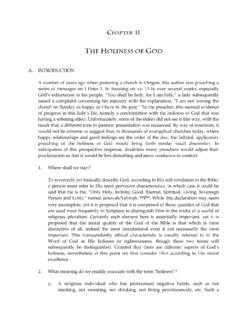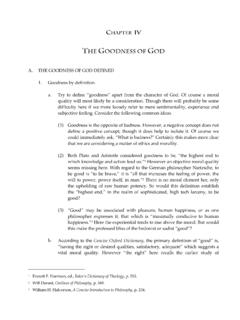Transcription of THE MERCY OF GOD - Bunyan Ministries
1 CHAPTER VIII. THE MERCY OF GOD. A. introduction 1. In Jesus Christ's parable of the Pharisee and the tax gatherer (Luke 18:9 14), we have portrayed two men, one who is wholly ignorant of his need of God's MERCY , and the other who hopes only in God's MERCY . a. The Pharisee is comfortable with himself. In fact he boasts in a personal sense of well being that others have not attained. His posture as a religious dignitary suggests that the word MERCY is part of his everyday vocabulary, though remote from personal experience. His mock confession, I thank Thee, v. 11, his perversion of sovereign grace, must be interpreted as, I congratulate myself as being worthy of grace. In theological discussion he would vainly confess that any unbeliever needs the grace of God. His definition of overt sin in v. 11b is certainly biblical.
2 His condemnation of sin is severe, though it is exclusively directed towards others. His appreciation of personal guilt is at best suppressed and at worst calloused. He is insensitive to pangs of personal corruption and the torments of his fallen nature. b. The tax gatherer also prays, but he appears as a man with low self esteem who is greatly, even visibly, physically troubled. He speaks of his need of MERCY with trembling and desperation. His posture is that of a broken, subdued man. His body shakes as he strikes his chest with deep remorse. He bemoans his condition, and so does the critical world around him. His confession leaves no doubt as to his estimate of his problem, God, be merciful to me, the [emphasis added] sinner, v. 13. Like Paul, he sees himself as the chief of sinners (I Tim. 1:15). However this man knows something of the true nature of God since he pleads, God, be merciful/be propitious/be kindly disposed, [ , hilaskomai] to me, the sinner.
3 He implores God that He be mercifully inclined toward him and so heal the present miserable breach that his sin has caused. This man is certainly aware of his distressing guilt before God and consequent need of grace. But more than this, he is in agony of soul in his present condition. Being so tormented, he urgently needs God's relief from this misery, which deliverance is distinctively called MERCY . This man, having cried to God for MERCY [a propitious, kindly disposition], went to his house justified [ , dikaio ] rather than the other, v. 14. The legal language here describes relief being brought to an unrighteous soul. 162 THE ATTRIBUTES OF GOD. 2. When David sinned in numbering Israel, he cried out in aguish of soul, I am in great distress. Let us now fall into the hand of the Lord for His mercies are great, but do not let me fall into the hand of man (II Sam.)
4 24:14). Only Jehovah's MERCY , based upon the presupposition that He has been offended, can relieve a guilty soul that is in agony. However, when man is offended, he tends to desire the extraction of vengeance rather than offer MERCY . B. THE MERCY OF GOD DIRECTED TOWARD MAN IN DISTRESS 1. MERCY is essentially God's relieving love poured out upon man in deep misery and trouble. Such affliction is spiritually rooted in the soul, though physical consequences are to be expected (Ps. 31:9 10; 32:3 4). Hence, when God's MERCY relieves the soul, it may be expected that there will be attending physical benefits (Ps. 30:1 2; 107:19 20). a. In the Old Testament MERCY is God's practical exhibition of loving kindness, dc e , chesed (Ps. 86:14 15; 136:1 26), which ought to be evident in His children. ex It also means practical pity and compassion, ,x - r, racham (Isa.
5 47:6; 49:10, 13). f (1) By way of illustration, in a sermon based upon Hosea 5:15, Jonathan Edwards declares, that it is God's manner to make men sensible of their misery and unworthiness before he appears in his MERCY and love to them.. The MERCY of God, which he shows to a sinner when he brings him home to the Lord Jesus Christ, is the greatest and most wonderful exhibition of MERCY and love, of which men are ever the subjects. 1 Edwards further draws from the life of Joseph to illuminate this point. (a) Joseph, before his great promotion in Egypt, languished in captivity for twelve years. While innocent when Potiphar's wife propositioned him, then imprisoned, his great suffering led to great MERCY . (b) Joseph's brothers, before being reconciled and cared for, suffered twenty two years of guilty anguish in their souls.
6 What pain of conscience they suffered, then the terror of standing before Joseph, (c) Joseph's father Jacob, before receiving gifts from his lost son and refuge in Egypt, also felt the sorrow of those arid twenty two years. How he mourned over a seeming insoluble tragedy. (2) David vividly describes the agony of his soul to which the relief of MERCY answers. In vexation and distress he implores God for deliverance. 2 Be 1. Jonathan Edwards, The Works of Jonathan Edwards, II, pp. 830-8. THE MERCY OF GOD 163. gracious to me, O LORD, for I am pining away; heal me, O LORD, for my bones are dismayed. 3 And my soul is greatly dismayed; But You, O LORD how long? 4 Return, O LORD, rescue my soul; save me because of your lovingkindness (Ps. 6:2 4; cf. 31:9 13; 51:1, 8). b. In the New Testament MERCY is similarly God's compassion, , eleos, relief from distress, or the outward manifestation of pity 2 He saved us, not on the basis of deeds which we have done in righteousness, but according to His MERCY , by the washing of regeneration and renewing of the Holy Spirit (Tit.)
7 3:5; cf. Luke 1:72). (1) The parable of the Good Samaritan best pictures the physical, relieving aspect of MERCY , and also its communicable nature. 33 But a Samaritan, who was on a journey, came upon him [most likely being a Jew]; and when he saw him, he felt compassion, 34 and came to him and bandaged up his wounds, pouring oil and wine on them; and he put him on his own beast, and brought him to an inn and took care of him (Luke 10:33 34). (2) More often it refers to God's MERCY toward the miserable sinner. Blessed be the God and Father of our Lord Jesus Christ, who according to His great MERCY has caused us to be born again to a living hope through the resur . rection of Jesus Christ from the dead (I Pet. 1:3). For you once were not a people, but now you are the people of God; you had not received MERCY , but now you have received MERCY (I Pet.
8 2:10; cf. Rom. 15:7 9; Tit. 3:5). (3) Note that while grace is God's response to the sinner in his guilt and rebellion, MERCY is God's response to the sinner who suffers on account of his guilt and rebellion. He is in agony over his sin; the sting causes him to cry out to God for relief. David felt the pain of guilt as if God had broken some of his bones (Ps. 51:8). 2. MERCY may be more specifically understood according to different categories, depending upon the areas where sin has had its effect; it also arouses the use of a variety of superlatives employed by the objects of such compassionate relief. a. Arthur Pink describes three aspects of God's MERCY as follows:3 (1) General MERCY , to all of His creation. The LORD is good to all, and His mercies are over all His works (Ps. 145:9). 2. Vine, Unger, White, eds., Vine's Expository Dictionary of Biblical Words, p.
9 403. 3. Arthur Pink, The Attributes of God, p. 73. 164 THE ATTRIBUTES OF GOD. (2) Special MERCY , to all of mankind. Be sons of your Father who is in heaven; for He causes His sun to rise on the evil and the good, and sends rain on the righteous and the unrighteous (Matt. 5:45). (3) Sovereign MERCY , to all heirs of salvation. For He says to Moses, I will have MERCY on whom I have MERCY , and I will have compassion on whom I have compassion. So then it does not depend on the man who wills or the man who runs, but on God who has MERCY (Romans 9:15 16). b. There are distinctive qualities of God's MERCY : (1) Great MERCY . Then Solomon said, You have shown great lovingkindness to Your servant David my father, according as he walked before You in truth and righteousness and uprightness of heart toward You; and You have reserved for Him this great lovingkindness, that you have given him a son to sit on his throne, as it is this day (I Kings 3:6).
10 (2) Covenant MERCY . I said, I beseech You, O LORD God of heaven, the great and awesome God, who preserves the covenant and lovingkindness for those who love Him and keep His commandments' (Neh. 1:5). (3) Abundant MERCY . For You, LORD, are good and ready to forgive, and abundant in lovingkindness to all who call upon You (Ps. 86:5). (4) Everlasting MERCY . For the lovingkindness of the LORD is from everlasting to everlasting on those who fear Him, and His righteousness to children's children (Ps. 103:17). (5) Tender MERCY . Because of the tender MERCY of our God, with which the Sunrise from on high will visit us (Luke 1:78). (6) Rich MERCY . But God, being rich in MERCY , because of His great love with which He loved us (Eph. 2:4). (7) Full MERCY . We count those blessed who endured. You have heard of the endurance of Job and have seen the outcome of the Lord's dealings, that the Lord is full of compassion and is merciful (Jas.)











